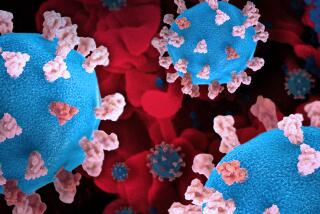Combination of Three Drugs Stops AIDS in Test Tube, Researchers Say
- Share via
NEW YORK — Scientists said today that a novel, three-drug combination devised by a graduate student stopped the AIDS virus from reproducing in the test tube. Now the question is whether it can work in the human body.
The strategy was devised by Yung-Kang Chow, a 31-year-old student at Harvard Medical School who is doing his thesis under the direction of Dr. Martin Hirsch.
They used the standard anti-AIDS drugs AZT and dideoxyinosine, also called ddI, plus a third compound called pyridinone. The three drugs were chosen to counter the AIDS virus’ ability to evolve and become resistant to individual drugs.
“We can prevent infection of new cells by this technique better than we have been able to do with any other strategy we’ve studied over the past six or seven years,” Hirsch said.
If the technique works in people, a patient’s immune system might be able to “at least keep the virus in control for long periods of time, and perhaps forever,” he said in a telephone interview.
The work is presented in today’s issue of the journal Nature by Hirsch, Chow and others at Massachusetts General Hospital and Harvard.
All three drugs attack a single enzyme, called reverse transcriptase, which the virus needs to reproduce. The idea behind the “convergent combination therapy” was that the virus would be unable to resist such a focused triple attack, Chow said in a telephone interview.
Hirsch said that while the virus was apparently eliminated under certain conditions, “it would be a mistake to say we can eradicate the virus when it’s present already within a cell.”
Starting this spring, the three-drug combination will be tested for signs of usefulness in a study of people with advanced HIV infections, he said.






